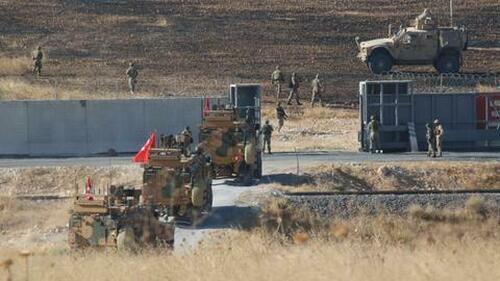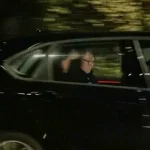
Turkish President Recep Tayyip Erdoğan has continued to be an awkward thorn in the side of NATO and among Western allies, most recently calling on US forces to "withdraw from east of the Euphrates River" in Syria.
He said this days ago upon returning from a controversial meeting with Russian President Vladimir Putin and Iranian President Ibrahim Raisi in Tehran, where high on the agenda was the Astana process the three powers previously brokered for joint security tasks in northern Syria.
"For once, America now should leave the east of Euphrates. This is the evaluation of the Astana process. They say that America should withdraw its troops from east of the Euphrates. This is also Türkiye's expectation," Erdogan had said in the remarks.

The 2019 Astana deal laid out Russian and Turkish demarcation lines of patrol - with Turkey having long seen the American military presence as a serious threat given the Pentagon's support for the YPG Kurdish group, which forms the backbone of the US-trained and funded Syrian Democratic Forces (SDF). Breaking with Washington on this vital matter for Ankara, Turkeys sees the YPG as but an extension of the outlawed PKK.
"You see that the American staff there train members of the terrorist organization," Erdogan continued, demanding that the US stop all training programs for Kurdish militants in Syria. Earlier this month Erdogan unveiled plans for a new, ramped up anti-Kurdish military operation across the border in Syria.
"During this training, they are waving the flag of the regime there. Why? Their job is to commit a terrorist act against the Turkish soldiers there. Here, too, they think they are deceiving the Turkish army by waving the regime's flag there. We won't be fooled," he added.
"As America supports terror organizations and as we are struggling against these terror organizations, our job will be easier if it withdraws from there or it ceases its support to them," Erdogan said.
Turkey has also been actively hinting at a grand 'Syrian refugee return' plan...
Syrians living in Turkey have expressed fear and concern about President Recep Tayyip Erdogan’s proposal to repatriate about one million of them to the northern region of Idlib, as the Turkish government continues to insist that it will carry out a military operation in northern Syria.
In May, Erdogan announced that the government was working to return Syrian refugees to the areas under Turkish security control in northern Syria. The plan includes building 250,000 housing units and equipping them with infrastructure that will extend between the cities of Azaz, Jarablus and al-Bab, all the way to Tal Abyad and Ain Issa.
Last week's Tehran summit also raised eyebrows in Europe, where German Foreign Minister Annalena Baerbock described a joint photo op with Erdogan and Putin as a "challenge" to NATO. At the summit, Erdogan had informed his Russian and Iranian counterparts Turkey is poised for a new military operation in northern Syria.
#German Foreign Minister Annalena Baerbock considered a joint picture of #Turkish President Recep Tayyip #Erdogan with #Russian leader Vladimir #Putin and their #Iranian counterpart Ebrahim Raisi during the trilateral Astana format over Syria a "challenge" to #NATO. pic.twitter.com/pcGx3mU75Z
— Al Mayadeen English (@MayadeenEnglish) July 23, 2022
Baerbock further described the photo as "more than incomprehensible" for her, "especially from the point of view of a NATO member."
Erdogan has also been causing trouble in Iraq, where last week an alleged Turkish artillery attack killed many civilians in what's described as a regional tourism hub with a high concentration of Kurds. According to The Guardian:
The bodies of nine tourists killed in a shelling attack in northern Iraq have been flown to Baghdad, as up to 23 survivors were treated in hospital and a political row intensified over who was responsible.
The Iraqi government has accused Turkish forces of an attack on its citizens in a resort near the Kurdish city of Zakho, in the country’s far north. Turkey denied it had launched strikes against civilians and instead claimed that its arch-foe, the Kurdistan Workers’ party (PKK), was responsible.
This led the Iraqi government to demand of immediate withdrawal of Turkish forces from all Iraqi soil in this northern region. Baghdad further demanded a formal apology.
Parts of this map could become a reality in the near future. Turks got their eyes on the oil fields of #kirkuk and northern Syria. Everyone should be worried of a declining Turkish economy. https://t.co/DR9BczSPnB
— Majid (@Majid25Heyran) July 25, 2022
However, Turkey denied that its armed forces were behind it, instead blaming the PKK for what the Turkish government called a "terrorist attack". But Turkey has a history of cross-border aggression in northern Iraq, where it says PKK militants often take refugee and embed within civilians areas.
Turkish President Recep Tayyip Erdoğan has continued to be an awkward thorn in the side of NATO and among Western allies, most recently calling on US forces to “withdraw from east of the Euphrates River” in Syria.
He said this days ago upon returning from a controversial meeting with Russian President Vladimir Putin and Iranian President Ibrahim Raisi in Tehran, where high on the agenda was the Astana process the three powers previously brokered for joint security tasks in northern Syria.
“For once, America now should leave the east of Euphrates. This is the evaluation of the Astana process. They say that America should withdraw its troops from east of the Euphrates. This is also Türkiye’s expectation,” Erdogan had said in the remarks.

The 2019 Astana deal laid out Russian and Turkish demarcation lines of patrol – with Turkey having long seen the American military presence as a serious threat given the Pentagon’s support for the YPG Kurdish group, which forms the backbone of the US-trained and funded Syrian Democratic Forces (SDF). Breaking with Washington on this vital matter for Ankara, Turkeys sees the YPG as but an extension of the outlawed PKK.
“You see that the American staff there train members of the terrorist organization,” Erdogan continued, demanding that the US stop all training programs for Kurdish militants in Syria. Earlier this month Erdogan unveiled plans for a new, ramped up anti-Kurdish military operation across the border in Syria.
“During this training, they are waving the flag of the regime there. Why? Their job is to commit a terrorist act against the Turkish soldiers there. Here, too, they think they are deceiving the Turkish army by waving the regime’s flag there. We won’t be fooled,” he added.
“As America supports terror organizations and as we are struggling against these terror organizations, our job will be easier if it withdraws from there or it ceases its support to them,” Erdogan said.
Turkey has also been actively hinting at a grand ‘Syrian refugee return’ plan…
Syrians living in Turkey have expressed fear and concern about President Recep Tayyip Erdogan’s proposal to repatriate about one million of them to the northern region of Idlib, as the Turkish government continues to insist that it will carry out a military operation in northern Syria.
In May, Erdogan announced that the government was working to return Syrian refugees to the areas under Turkish security control in northern Syria. The plan includes building 250,000 housing units and equipping them with infrastructure that will extend between the cities of Azaz, Jarablus and al-Bab, all the way to Tal Abyad and Ain Issa.
Last week’s Tehran summit also raised eyebrows in Europe, where German Foreign Minister Annalena Baerbock described a joint photo op with Erdogan and Putin as a “challenge” to NATO. At the summit, Erdogan had informed his Russian and Iranian counterparts Turkey is poised for a new military operation in northern Syria.
#German Foreign Minister Annalena Baerbock considered a joint picture of #Turkish President Recep Tayyip #Erdogan with #Russian leader Vladimir #Putin and their #Iranian counterpart Ebrahim Raisi during the trilateral Astana format over Syria a “challenge” to #NATO. pic.twitter.com/pcGx3mU75Z
— Al Mayadeen English (@MayadeenEnglish) July 23, 2022
Baerbock further described the photo as “more than incomprehensible” for her, “especially from the point of view of a NATO member.”
Erdogan has also been causing trouble in Iraq, where last week an alleged Turkish artillery attack killed many civilians in what’s described as a regional tourism hub with a high concentration of Kurds. According to The Guardian:
The bodies of nine tourists killed in a shelling attack in northern Iraq have been flown to Baghdad, as up to 23 survivors were treated in hospital and a political row intensified over who was responsible.
The Iraqi government has accused Turkish forces of an attack on its citizens in a resort near the Kurdish city of Zakho, in the country’s far north. Turkey denied it had launched strikes against civilians and instead claimed that its arch-foe, the Kurdistan Workers’ party (PKK), was responsible.
This led the Iraqi government to demand of immediate withdrawal of Turkish forces from all Iraqi soil in this northern region. Baghdad further demanded a formal apology.
Parts of this map could become a reality in the near future. Turks got their eyes on the oil fields of #kirkuk and northern Syria. Everyone should be worried of a declining Turkish economy. https://t.co/DR9BczSPnB
— Majid (@Majid25Heyran) July 25, 2022
However, Turkey denied that its armed forces were behind it, instead blaming the PKK for what the Turkish government called a “terrorist attack”. But Turkey has a history of cross-border aggression in northern Iraq, where it says PKK militants often take refugee and embed within civilians areas.







